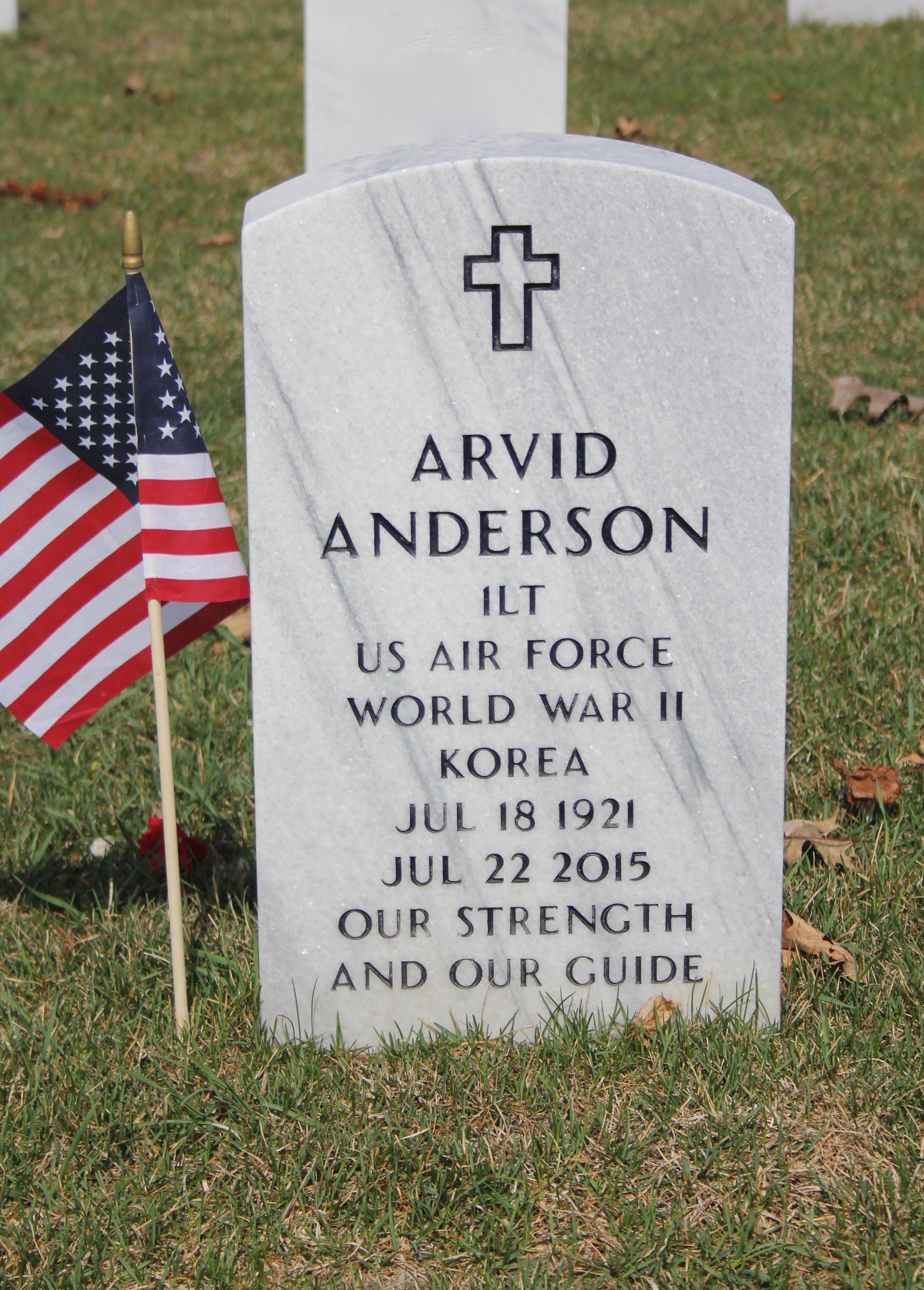A pioneering leader in Public Sector Labor Relations for over 60 years. He worked at the Wisc Employment Relations Commission 1948 -1967 and was the first Chairman of the Office of Collective Bargaining, NYC, 1967-1987. He was a private arbitrator until 2009.
Arvid was humble, kind, patient, generous, wise, humorous, and loving. He hosted family reunions in Florida for over 20 years, always raising a toast: "To our ancestors."
Arvid was born July 18, 1921 in Hammond, Ind. to Swedish immigrants Carl Anderson and Alma Hagstrom. He loved baseball, and rooted for home teams wherever he lived. In WWII, Arvid was a B-17 navigator. He was shot down and spent 7 months as a German POW; he earned a Purple Heart. He also served in Korea.
He is survived by family who loved him dearly: wife of 71 years, Avis (née Larratt); son, Steven (Suzanne) Anderson; daughters, Susan (Jeff) Dean; Kristin (Robert Reilly) Anderson; Linda (Michael) Hoard; 10 grandchildren and brother, Norman (Peggy) Anderson.
Memorial Service at Jones-Harrison Residence, Minneapolis, Fri, Aug 7 at 11 AM. Memorials preferred to U of Wisc Foundation, supportuw.org: Law Student Support (Fund: 112538368) with note "For Labor Law Students" or UW Arboretum Restoration Fund.
~ Published on July 26, 2015
~.~.~.~.~.~.~.~.~.~.~.~.~.~.~.~.~.~.~.~.~.~.~.~.~.~.~.~.~.~.
Arvid Anderson, New York City's First Collective Bargaining Chief, Dies at 94
Arvid Anderson, a low-key Midwesterner who as New York City's first director of collective bargaining won the respect of labor and management by calmly and methodically resolving volatile contract disputes, died on July 22 in Minneapolis. He was 94.
His son, Steven, confirmed the death.
Mr. Anderson left a top state labor-relations post in Wisconsin to become chairman of the city's collective bargaining board under Mayors John V. Lindsay, Abraham D. Beame and Edward I. Koch, serving from 1968 to 1987. "My job is to make the negotiating machinery work," he once said.
His passion for labor peace was inspired by the violence he had witnessed as a teenager when steelworkers sought to organize in his native Indiana, and by the Memorial Day massacre on the southeast side of nearby Chicago in 1937, when the police killed 10 unarmed supporters of strikers at Republic Steel.
"I was convinced there had to be a better way to resolve labor disputes," he said in a 2005 interview.
His patience as a conciliator may well have been honed during his time as a prisoner for seven months after his bomber was shot down by the Germans over Europe during World War II.
Arvid Anderson was born in Hammond, Ind., on July 18, 1921. His father, Carl, a carpenter, and his mother, the former Alma Hagstrom, were Swedish immigrants.
Mr. Anderson served for 33 months with the Army Air Forces during the war. He graduated from the University of Wisconsin with a bachelor's degree in labor economics in 1946 and then from its law school. He returned to active duty during the Korean War as a navigator and a first lieutenant in the Judge Advocate General's Division. He was awarded the Air Medal and the Purple Heart.
Mr. Anderson was commissioner of the Wisconsin Employment Relations Board when he was invited to New York by Mr. Lindsay and, among others, Victor Gotbaum, who ran the nation's largest municipal employees' union.
New York created its collective bargaining board with seven members: two appointed by the mayor, two picked by the municipal employees' unions and three, called impartial members, chosen unanimously by the other four. The original three impartial members were Mr. Anderson, Saul Wallen and Eric J. Schmertz. Mr. Anderson was elected as the panel's first chairman.
The board was empowered to help mediate disputes, resolve deadlocks and make nonbinding recommendations after fact-finding.
Mr. Anderson's tenure began with a strike by city sanitation workers, which came after walkouts by employees of the welfare department, the Transit Authority and the Board of Education, and which degenerated into a political tug of war between Mr. Lindsay and Gov. Nelson A. Rockefeller.
In 1972, after the state banned strikes by most public employees, New York became the first major American city to require that contract disputes go to binding arbitration once the board had declared management and labor at an impasse.
"Where neither the strike nor arbitration is legally available to resolve employment disputes, we have witnessed the chaos of illegal and sometimes violent strikes," Mr. Anderson said in 1982.
Continue reading the main story
During New York City's fiscal crisis in the 1970s, he dealt with volatile labor leaders like Mr. Gotbaum; the teachers' union leader, Albert Shanker; and the sanitation union boss, John J. DeLury, leading Mr. Anderson to conclude by the end of the decade, "I'm just thankful that I've survived here."
Once, he recalled, the city's director of labor relations was so angered by an arbitration ruling that he threatened to appeal it to the state, "to the courts, and, if need be, to the pope."
"I told him it would not do him any good because I had just been in Rome and had received the papal blessing," Mr. Anderson said. "In any event, the comment defused the situation and the city never appealed the decision."
Mr. Anderson, who grew up as a Chicago Cubs fan, also sometimes served as a regional arbitrator for Major League Baseball. In 1985 he awarded Wade Boggs, the Boston Red Sox third baseman at the time, a $1 million salary for the season instead of the $675,000 that the team had offered.
In addition to his son, he is survived by his wife, the former Avis M. Larratt; three daughters, Susan Dean, Kristin Anderson and Linda Hoard; and 10 grandchildren.
Unlike some negotiators, who relished the limelight, Mr. Anderson was content to work in obscurity. For him, a great day of relaxation was a round of golf.
"When I do play, I put the names of my problems on the golf balls," he said. "By the end of a round, some of them have disappeared entirely."
~ New York Times, By Sam Roberts July 23, 2015
A pioneering leader in Public Sector Labor Relations for over 60 years. He worked at the Wisc Employment Relations Commission 1948 -1967 and was the first Chairman of the Office of Collective Bargaining, NYC, 1967-1987. He was a private arbitrator until 2009.
Arvid was humble, kind, patient, generous, wise, humorous, and loving. He hosted family reunions in Florida for over 20 years, always raising a toast: "To our ancestors."
Arvid was born July 18, 1921 in Hammond, Ind. to Swedish immigrants Carl Anderson and Alma Hagstrom. He loved baseball, and rooted for home teams wherever he lived. In WWII, Arvid was a B-17 navigator. He was shot down and spent 7 months as a German POW; he earned a Purple Heart. He also served in Korea.
He is survived by family who loved him dearly: wife of 71 years, Avis (née Larratt); son, Steven (Suzanne) Anderson; daughters, Susan (Jeff) Dean; Kristin (Robert Reilly) Anderson; Linda (Michael) Hoard; 10 grandchildren and brother, Norman (Peggy) Anderson.
Memorial Service at Jones-Harrison Residence, Minneapolis, Fri, Aug 7 at 11 AM. Memorials preferred to U of Wisc Foundation, supportuw.org: Law Student Support (Fund: 112538368) with note "For Labor Law Students" or UW Arboretum Restoration Fund.
~ Published on July 26, 2015
~.~.~.~.~.~.~.~.~.~.~.~.~.~.~.~.~.~.~.~.~.~.~.~.~.~.~.~.~.~.
Arvid Anderson, New York City's First Collective Bargaining Chief, Dies at 94
Arvid Anderson, a low-key Midwesterner who as New York City's first director of collective bargaining won the respect of labor and management by calmly and methodically resolving volatile contract disputes, died on July 22 in Minneapolis. He was 94.
His son, Steven, confirmed the death.
Mr. Anderson left a top state labor-relations post in Wisconsin to become chairman of the city's collective bargaining board under Mayors John V. Lindsay, Abraham D. Beame and Edward I. Koch, serving from 1968 to 1987. "My job is to make the negotiating machinery work," he once said.
His passion for labor peace was inspired by the violence he had witnessed as a teenager when steelworkers sought to organize in his native Indiana, and by the Memorial Day massacre on the southeast side of nearby Chicago in 1937, when the police killed 10 unarmed supporters of strikers at Republic Steel.
"I was convinced there had to be a better way to resolve labor disputes," he said in a 2005 interview.
His patience as a conciliator may well have been honed during his time as a prisoner for seven months after his bomber was shot down by the Germans over Europe during World War II.
Arvid Anderson was born in Hammond, Ind., on July 18, 1921. His father, Carl, a carpenter, and his mother, the former Alma Hagstrom, were Swedish immigrants.
Mr. Anderson served for 33 months with the Army Air Forces during the war. He graduated from the University of Wisconsin with a bachelor's degree in labor economics in 1946 and then from its law school. He returned to active duty during the Korean War as a navigator and a first lieutenant in the Judge Advocate General's Division. He was awarded the Air Medal and the Purple Heart.
Mr. Anderson was commissioner of the Wisconsin Employment Relations Board when he was invited to New York by Mr. Lindsay and, among others, Victor Gotbaum, who ran the nation's largest municipal employees' union.
New York created its collective bargaining board with seven members: two appointed by the mayor, two picked by the municipal employees' unions and three, called impartial members, chosen unanimously by the other four. The original three impartial members were Mr. Anderson, Saul Wallen and Eric J. Schmertz. Mr. Anderson was elected as the panel's first chairman.
The board was empowered to help mediate disputes, resolve deadlocks and make nonbinding recommendations after fact-finding.
Mr. Anderson's tenure began with a strike by city sanitation workers, which came after walkouts by employees of the welfare department, the Transit Authority and the Board of Education, and which degenerated into a political tug of war between Mr. Lindsay and Gov. Nelson A. Rockefeller.
In 1972, after the state banned strikes by most public employees, New York became the first major American city to require that contract disputes go to binding arbitration once the board had declared management and labor at an impasse.
"Where neither the strike nor arbitration is legally available to resolve employment disputes, we have witnessed the chaos of illegal and sometimes violent strikes," Mr. Anderson said in 1982.
Continue reading the main story
During New York City's fiscal crisis in the 1970s, he dealt with volatile labor leaders like Mr. Gotbaum; the teachers' union leader, Albert Shanker; and the sanitation union boss, John J. DeLury, leading Mr. Anderson to conclude by the end of the decade, "I'm just thankful that I've survived here."
Once, he recalled, the city's director of labor relations was so angered by an arbitration ruling that he threatened to appeal it to the state, "to the courts, and, if need be, to the pope."
"I told him it would not do him any good because I had just been in Rome and had received the papal blessing," Mr. Anderson said. "In any event, the comment defused the situation and the city never appealed the decision."
Mr. Anderson, who grew up as a Chicago Cubs fan, also sometimes served as a regional arbitrator for Major League Baseball. In 1985 he awarded Wade Boggs, the Boston Red Sox third baseman at the time, a $1 million salary for the season instead of the $675,000 that the team had offered.
In addition to his son, he is survived by his wife, the former Avis M. Larratt; three daughters, Susan Dean, Kristin Anderson and Linda Hoard; and 10 grandchildren.
Unlike some negotiators, who relished the limelight, Mr. Anderson was content to work in obscurity. For him, a great day of relaxation was a round of golf.
"When I do play, I put the names of my problems on the golf balls," he said. "By the end of a round, some of them have disappeared entirely."
~ New York Times, By Sam Roberts July 23, 2015
Family Members
Sponsored by Ancestry
Advertisement
Explore more
Sponsored by Ancestry
Advertisement




